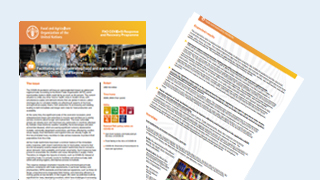Codex standards and regional committees key to FAO COVID-19 response on trade and food safety
The COVID-19 pandemic will have an unprecedented impact on global and regional trade. According to the World Trade Organization, world merchandise trade in 2020 could fall by as much as 32 percent.
New policy guidance, part of the FAO COVID-19 Response and Recovery Programme, describes how the current economic recession is raising serious concerns about hunger and malnutrition. It goes on to explain how ad-hoc trade restrictions, including food safety measures that may not be science based, have worsened the situation and caused disruptions in supply chains. The guidance describes the need therefore to address policy barriers to create a predictable trading environment.
The policy brief identifies five action points that include a key role for Codex standards as well as for regional trade networks and platforms, such as the FAO/WHO Regional Coordinating Committees.
One of the expected results from the four-year programme that will require a 50 million USD investment is “enhanced regulatory cooperation at the regional level to improve regulatory oversight in agricultural value chains, promote the implementation and use of science-based standards (such as Codex) and promote mutual recognition and harmonization of food safety systems”.
Codex Secretary Tom Heilandt said: “Actions on COVID-19 and food safety that harness the expertise of the Codex regions will be essential in fully comprehending the critical issues at national level. Codex committees are already fully geared up and developing the necessary guidance including innovative digital solutions to ensure food remains safe and can be traded both during and after the pandemic.”
Read more
Download the policy document here.
At the heart of the Codex mandate are the core values of collaboration, inclusiveness, consensus building and transparency. Governmental and non-governmental, public and private organizations alike play a vital role in ensuring Codex texts are of the highest quality and based on sound science.
Codex would have little authority in the field of international standard setting if it did not welcome and acknowledge the valuable contributions made by observers. Expert technical bodies, industry and consumer associations
contribute to the standard-setting process in a spirit of openness, collaboration and transparency.
Intergovernmental organizations (IGOs) and international non-governmental organizations (NGOs) can apply for observer status in Codex in order to attend and put forward their views at every stage of the standard-setting process.
 Current Codex Alimentarius Commission
Current Codex Alimentarius Commission
Codex standards and regional committees key to FAO COVID-19 response on trade and food safety
The COVID-19 pandemic will have an unprecedented impact on global and regional trade. According to the World Trade Organization, world merchandise trade in 2020 could fall by as much as 32 percent.
New policy guidance, part of the FAO COVID-19 Response and Recovery Programme, describes how the current economic recession is raising serious concerns about hunger and malnutrition. It goes on to explain how ad-hoc trade restrictions, including food safety measures that may not be science based, have worsened the situation and caused disruptions in supply chains. The guidance describes the need therefore to address policy barriers to create a predictable trading environment.
The policy brief identifies five action points that include a key role for Codex standards as well as for regional trade networks and platforms, such as the FAO/WHO Regional Coordinating Committees.
One of the expected results from the four-year programme that will require a 50 million USD investment is “enhanced regulatory cooperation at the regional level to improve regulatory oversight in agricultural value chains, promote the implementation and use of science-based standards (such as Codex) and promote mutual recognition and harmonization of food safety systems”.
Codex Secretary Tom Heilandt said: “Actions on COVID-19 and food safety that harness the expertise of the Codex regions will be essential in fully comprehending the critical issues at national level. Codex committees are already fully geared up and developing the necessary guidance including innovative digital solutions to ensure food remains safe and can be traded both during and after the pandemic.”
Read more
Download the policy document here.
 Codex and Observer
Codex and Observer
around the world since ancient times.
We might not always know where it comes from,
but we expect it to be available, safe and of good quality.










Leave a comment